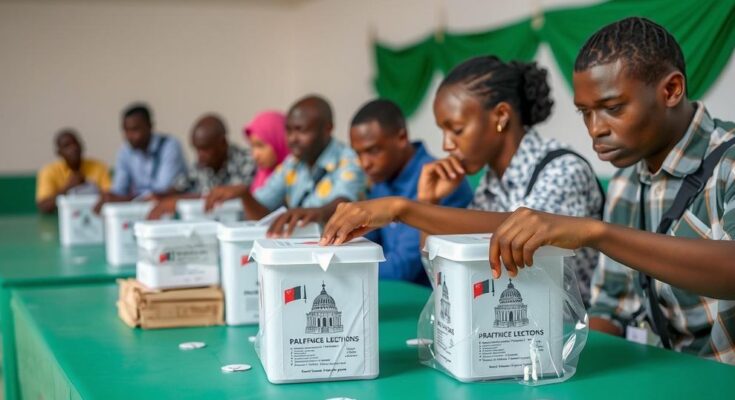Voters in Comoros are electing members of a 33-seat parliament amid allegations of electoral irregularities following President Azali Assoumani’s controversial re-election last year. While some opposition parties call for a boycott, others urge participation to highlight the regime’s flaws. The results are expected soon, with tensions high regarding Assoumani’s potential succession plans for his son.
Voters in Comoros are participating in elections for the Indian Ocean nation’s 33-seat parliament, following President Azali Assoumani’s contentious re-election last year, which opposition factions accuse of being fraught with irregularities. Despite these claims, ruling party officials have vehemently denied any misconduct. Polling commenced early Sunday for approximately 338,000 registered voters, marking the first parliamentary elections since January 2020. Nearly 100 candidates, vetted by the country’s Supreme Court, are vying for parliamentary positions.
Opponents of Assoumani have raised alarm about his authoritarian tendencies, suggesting he may be grooming his eldest son, Nour El-Fath, for succession when his term concludes in 2029. Assoumani has been in power since a coup in 1999 and has secured victories in three subsequent elections. In a notable move in 2024, he bestowed significant powers upon his son, entrusting him with the coordination of government affairs. As tensions mount, certain opposition factions, such as Juwa—led by former President Ahmed Abdallah Sambi, who is serving a life sentence—have called for a boycott, although some parties have disagreed with this stance.
Hamidou Karihila, a candidate from the opposition Hope of the Comoros party, stated, “The Azali regime is weakened… by participating in these elections we are contributing to further exposing the flaws in its system and accelerating its inevitable fall.” Election results are anticipated by the end of the week, further igniting the political landscape within the archipelago.
The political landscape of Comoros has been tumultuous, largely shaped by President Azali Assoumani’s long-standing rule since he initially seized power through a coup in 1999. Assoumani has faced criticism for authoritarian governance, particularly following his controversial re-election in 2022, which was contested by opposition factions citing electoral irregularities. The current parliamentary elections come after a three-year hiatus since the last elections and amidst growing concerns over succession plans involving his son.
The parliamentary elections in Comoros are a significant political event, reflective of deep-seated tensions and allegations of authoritarianism surrounding President Azali Assoumani’s regime. While some opposition groups call for a boycott, others, like the Hope of the Comoros party, are actively participating in hopes of demonstrating the weaknesses in the government system. The outcome of these elections could have substantial implications for the future political trajectory of Comoros.
Original Source: www.naroomanewsonline.com.au




